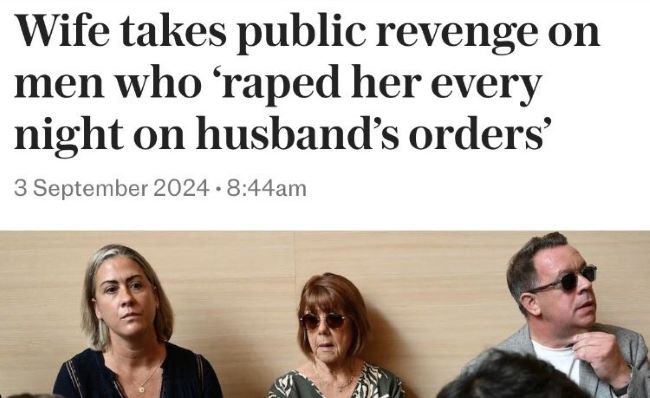These headlines are not only tiresome and lazy but also perpetuate harmful stereotypes, failing to recognise the profound courage and quest for justice demonstrated by survivors like Gisele Pelicot.
The recent headline in the Telegraph regarding the case of Gisele Pelicot is a disgusting example of the pervasive misogyny that continues to plague media narratives. The headline, which frames Pelicot’s pursuit of justice as “revenge,” not only trivialises her suffering but also perpetuates harmful stereotypes about women and their responses to trauma. This case, where police identified at least 92 rapes committed by 72 men, is a harrowing testament to the depths of human depravity and the entitlement of men who believe they can exploit and violate women without consequence.
Gisele Pelicot, now 72, endured over a decade of unimaginable abuse, drugged and raped by numerous men at the behest of her husband. The fact that she only learned of this abuse in 2020, when informed by the police, adds another layer of horror to her ordeal. The trial, which will force her to confront video evidence of her abuse for the first time, is expected to be a “horrible ordeal” for her. Yet, despite the immense pain and betrayal she has suffered, Pelicot has shown remarkable courage, stating that she is not seeking justice for herself alone but for every woman in France.
The use of the term “revenge” in the headline is deeply problematic. It suggests that Pelicot’s actions are driven by a desire for personal retribution rather than a quest for justice. This framing diminishes the gravity of her experience and shifts the focus away from the heinous crimes committed against her. It also perpetuates the stereotype of the “vengeful woman,” a trope that has long been used to discredit women’s legitimate grievances and struggles for justice.
Likewise, the headline implies that the men involved were merely following “orders,” as if they were passive participants in these rapes. This narrative absolves them of responsibility and downplays the severity of their actions. The reality is that these men willingly participated in the rape of a drugged and unconscious woman. Not one of them reported the abuse to the authorities or attempted to stop it. Their actions were not the result of coercion or manipulation, they were deliberate and calculated acts of violence.
The entitlement of these men is staggering. They believed they had the right to violate Pelicot’s body without her consent, and they did so repeatedly over many years. This sense of entitlement is rooted in a culture that devalues women and views them as objects to be used and discarded. It is a culture that excuses and normalises male violence against women, often blaming the victims for their own suffering.
Pelicot’s husband, who orchestrated this abuse, is the epitome of depravity. His actions were not only a betrayal of the marital bond but also a gross violation of human decency. He drugged his wife and invited other men to rape her, all while she was unconscious and unable to defend herself. His behaviour is a blatant reminder of the dangers of unchecked male power and the lengths to which some men will go to exert control over women.
Despite the overwhelming evidence of her abuse, Pelicot has shown extraordinary resilience and determination. Her decision to pursue justice is not only a personal act of defiance but also a powerful statement on behalf of all women who have suffered similar fates. She is fighting not just for herself but for every woman in France who has been silenced, shamed, or ignored. Her courage is remarkable in a world that often seems indifferent to the suffering of women.
The Telegraph’s headline is an utter disgrace of the misogyny that continues to shape media narratives. It trivialises Pelicot’s suffering, absolves the perpetrators of responsibility, and perpetuates harmful stereotypes about women. Gisele Pelicot’s story is not one of revenge, it is a story of justice, courage, and resilience. Her fight is a fight for all women, and her bravery is a testament to the strength of the human spirit in the face of unimaginable suffering and pain.
Do better.
If you, or someone you know, has experienced any form of violence, physical, sexual, or psychological, please reach out the following services below ….
Women’s Aid – call 1800 341 900
An Garda Siochana – call 999 / 112
Rape Crisis Centre – call 1800 77 8888







